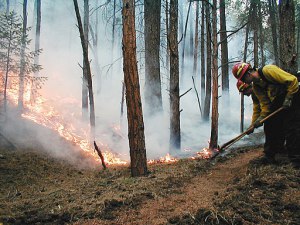 By Andy Mueller, General Manager, Colorado River District
By Andy Mueller, General Manager, Colorado River District
It’s not fire season right now – or at least it shouldn’t be – but continuing drought and seemingly constant shifts in “normal” weather patterns set the stage for record-setting, winter wildfires in California that cost the federal government billions to contain, all which highlight similar concerns for Colorado.
Ongoing drought cycles and the overgrown condition of our forests leave Colorado and the entire American West at risk of even more destructive and costly fire seasons in the days and years ahead.
The federal government is the single largest landowner in Colorado and the majority of those lands are managed by the U.S. Forest Service. In fact, federal agencies own and manage more than a 35% of the land in Colorado, and in some Western Slope counties that percentage is north of 90%.
Now consider that most of the water used in our homes and businesses, and to irrigate our crops in Colorado, originates on federal lands. This means the federal government has a major responsibility for the management and health of our forests and watersheds.
But the feds have largely abdicated that responsibility.
Year after year, federal dollars appropriated for critical forest health and forest management are diverted to pay for the ever-increasing cost of firefighting. Consequently, the very programs that would reduce wildfire risk have been drastically reduced. For water managers, the federal government’s approach to fighting wildfires presents an insidious threat beyond the immediate and serious danger of the wildfires themselves.
Federal agencies currently determine wildfire budgets based on the average costs of fighting fires over each decade and the U.S. Forest Service funds firefighting entirely through its annual operating budget. This outdated budgeting process clearly fails to consider that fire seasons are growing longer and more expensive with every passing year – putting our watersheds and our water resources at even greater risk.
The problem has become so large that the Forest Service now spends more than half of its annual budget fighting wildfire emergencies, leaving little left to either prevent fires or to restore burned forest ecosystems. That trend will continue to worsen if it isn’t addressed.
While the Colorado River District supports full funding for firefighting, it should not come at the expense of forest fire prevention and watershed health. If we continue on the current path, wildland fires and the attendant expense of fighting those fires will continue to set new records – all to the exclusion of improving our forests’ heath and reducing the future risk of wildfires.
It’s time to change the way federal dollars are appropriated for firefighting. It’s time to end the practice of “fire borrowing” that deprives federal land management agencies of the resources they need to protect our most valuable natural resources.
Catastrophic wildfires are no less disasters than are hurricanes and catastrophic floods. Accordingly, they should be funded like other disasters through the Federal Emergency Management Administration (FEMA) or other emergency response agencies, not from the Forest Service’s day-to-day planning and management budget.
Colorado’s congressional delegation has an opportunity to act now. Congress is currently working on a bill to fund disaster recoveries as part of a larger bill to keep the government operating. A permanent fire funding fix belongs in this bill.
 By Justin Domeroski (This image is from the FEMA Photo Library.) [Public domain], via Wikimedia CommonsTo their credit, Colorado Senators Michael Bennet and Cory Gardner, and Congressman Scott Tipton have worked hard to advance bipartisan solutions to the “fire borrowing” problem. Their efforts, however, have been derailed by partisan demands from both sides of the aisle that are outside of the scope of the fire funding problem.
By Justin Domeroski (This image is from the FEMA Photo Library.) [Public domain], via Wikimedia CommonsTo their credit, Colorado Senators Michael Bennet and Cory Gardner, and Congressman Scott Tipton have worked hard to advance bipartisan solutions to the “fire borrowing” problem. Their efforts, however, have been derailed by partisan demands from both sides of the aisle that are outside of the scope of the fire funding problem.
Our current system isn’t working. It’s time to prioritize and fund proactive forest management to protect our forests, our watersheds, and our local economies. Congress must act now. It’s no less than our water supplies that is at risk.
Advertisements Share this:






